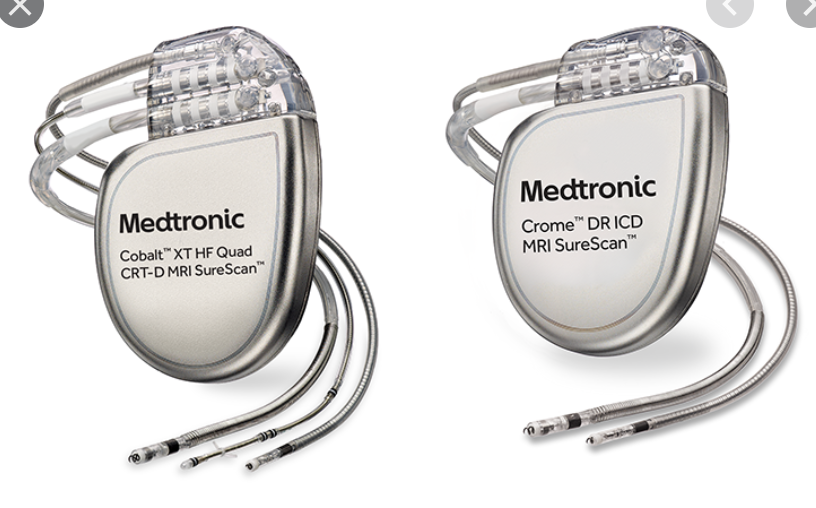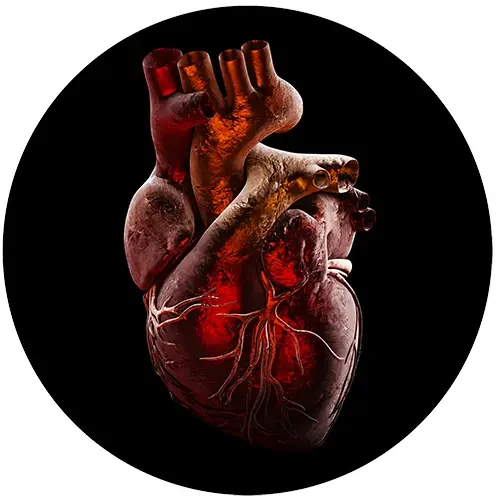Transvenous ICDs have proven to reduce the risks of death and illness in those with life threatening ventricular arrhythmias. They have become the standard treatment for those who have survived cardiac arrest and for those who are at a high risk of sudden cardiac arrest. ICDs can lower your risk for sudden death from cardiac arrest more effectively than medication alone. For many people, a subcutaneous ICD (S-ICD) is a reasonable alternative therapy.
How does an ICD work?
The traditional ICD consists of a generator that sends pulses through leads (wires) into the heart. These leads connect the pulse generator to specific locations in the heart through veins. The ICD detects irregular and life threatening heart rhythms coming from the lower chambers of the heart.
Many ICDs initially respond to potentially dangerous rhythms with low-energy pacing. All ICDs respond to more dangerous rhythms with a shock to reset the heart rhythm and prevent sudden cardiac arrest.
What does it feel like?
When the ICD is pacing, most people are unaware of it or they feel a painless fluttering. A shock to end ventricular tachycardia (VT) or ventricular fibrillation (VF), is dramatic though. Descriptions often include phrases like "a kick in the chest." Unpleasant though this sounds, it lasts only seconds and can keep you alive!
Many ICDs can also work as a basic pacemaker anytime the heart rate drops below a certain preset threshold. The ICD records and stores information about your heart rhythm as well as what action was taken by the machine. Your electrophysiologist will review this stored information..
Do I need an ICD?
To determine whether you need an ICD, your doctor will use results of diagnostic tests such as an EKG, echocardiogram, cardiac MRI, and a Holter monitor or event recorder. They will also use information about your history of arrhythmias and family history of sudden cardiac arrest. Deciding whether to implant an ICD is an important medical choice. It requires your doctor's clinical judgement.
A comparison with S-ICDs is on our S-ICD page.
Implantation surgery
This minor surgery may require you to have an overnight hospital stay or you may have it done as an outpatient. Your doctor will provide you with instructions about fasting before surgery and about taking your normal medications beforehand.
The surgical team will either sedate you (put you into a light sleep) or use a general anesthetic. During the procedure, x-ray imaging is used to guide feeding the leads into the heart through veins near your collarbone. Depending on the type of ICD being used, there may be either 1 or 2 leads. Once the leads are in place, they are attached to the heart wall. The other ends of the leads are attached to the generator.
Once everything is in place, your doctor will test the ICD and will program it for your specific heart rhythm problem. This testing may involve speeding up your heart and then shocking it back to normal. The entire procedure usually takes a few hours.
Risks
Like any surgery, there are risks with ICD implantation. Bleeding and blood clotting are possible. Adjacent structures can be damaged. A vein or lung can be punctured. It is possible to damage heart tissue. Dangerous arrhythmias can occur. So can stroke or heart attack.
Deaths have occurred but they are quite rare.
Risks after the surgery include:
infection, erosion of skin near the device
leads moving out of place in the heart
electrodes causing irritation or damage to the surrounding tissues
difficulty coping with the device
improper shock
the device moving out of place
Recovery
As with any surgery, you will not be able to drive right away, so will need to arrange for a ride home. You will also need to avoid abrupt movements that raise your left arm above your shoulder for about 2-3 weeks. This will help assure that the leads do not move until the area has healed.
Because of this restriction you will not be able to drive during that time. If you have no history of life-threatening arrhythmias, you can usually resume driving soon after. Your doctor may tell you to avoid vigorous above-the-shoulder activities for the first few weeks. These might include golf, tennis, swimming, and vacuuming. Your doctor may also tell you to avoid lifting heavy objects and strenuous exercise programs. You also may be advised to avoid contact sports indefinitely as heavy contact may damage your device or the wires.
Living with an ICD
Driving
Driving may be dangerous if you have an ICD and a history of VT or VF. Arrhythmia and shocks can cause fainting, which is dangerous for you, passengers, motorists, and pedestrians. Your doctor may recommend that you not drive for your first 6 months with an ICD if it was implanted because of a previous cardiac arrest or ventricular arrhythmia. If you have no shocks during these six months, you may be able to drive again. If you do have a shock, regardless of whether you faint or not, tell your doctor and follow their recommendations. Most of the time, you will be discouraged from driving until you have been shock-free for another 6 months. Usually, if you have an ICD, you can not get a commercial driver's license.
Electrical interference from other machinery
Problems with ICDs due to electrical interference are rare, but you should still take precautions.
- It is safe to talk on a cellphone. You should avoid placing it within 6 inches of your ICD site when the phone is on. The ICD could mistake your phone's signal for a heartbeat, and slow your heartbeat down.
- Keep headphones at least 6 inches away from your ICD site. Magnets in headphones may interfere with the ICD.
- Keep all magnets at least 6 inches from your site.
- Your ICD may set off airport security alarms. You will be given a card to show airport personnel. Handheld metal detectors have a magnet that can interfere with your ICD. Limit scanning over the site of your ICD for less than 30 seconds or request a manual search.
- Let doctors, technicians, and dentists know you have an ICD. Some types of ICDs are safe with procedures like MRI, or radiofrequency ablation, but others are not.
- If you must work with welding equipment, chainsaws, high voltage transformers, or motor generators, keep your ICD at least 2 feet away from the equipment.
Consult your doctor or the ICD manufacturer about safety around these types of machines. For example, the following pose little or no risk to your ICD:
- microwave ovens
- TVs, remote controls
- radios
- toasters
- electric blankets
- shavers
- drills
- computers
- scanners
- printers
- GPSs..
Continuing with your prescription drugs
Having an ICD provides a lot of insurance against immediately life-threatening rhythms like VF and VT. But it is not a cure for rhythm problems in general. Shocks from an ICD are something to be avoided. You will likely need to continue with drugs to reduce your heart rate or regulate your rhythm.
Other arrhythmias
Many HCM patients experience other arrhythmias like atrial fibrillation (afib). Currently there are no ICDs available that provide protection against these other arrhythmias.
What if things go wrong?
As with any device, things can sometimes go wrong with ICDs. Rarely, leads need to be replaced, and this requires surgery.
Inappropriate shocks occur sometimes. This can usually be addressed by your doctor changing the ICD's programming in their office.
It is important to stay in touch with an electrophysiologist to manage your device.
Battery replacement
The lithium battery in your ICD can last up to 7 years. It will be checked during your regular checkups, which should be about every 6 months. When the battery is almost out of power, your old shock generator will be replaced with a new one during a minor outpatient procedure.










